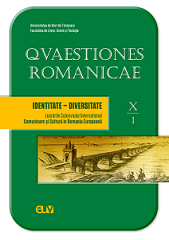Valorificarea repertoriului plurilingv și pluricultural de origine orientală în predarea românei ca L2. Termeni referitori la viața publică
Building on the Plurilingual and Pluricultural Repertoire of Oriental Origin in Teaching Romanian as a Second Language. Terms regarding public life
Author(s): Irina DincăSubject(s): Language studies, Education, Foreign languages learning, Pedagogy
Published by: Universitatea de Vest din Timişoara
Keywords: plurilingual repertoire; pluricultural repertoire; Romanian as a second language; oriental languages; mental dictionary;
Summary/Abstract: This paper aims to present an analysis of the process of building on a plurilingual and pluricultural repertoire of oriental origin, from the perspective of integrating this linguistic and cultural resource in the process of teaching Romanian as a second language to students speaking languages such as Arabic, Turkish or Persian. The methodological premises of this approach are offered by theoretical studies on the influence of oriental languages on the Romanian vocabulary, but also by the suggestions offered by the Complementary Volume with New Descriptors from 2020, which develop the descriptors from the Common European Framework of Reference for Languages published in 2001. The first stage in this process of developing the plurilingual and pluricultural repertoire is gaining the awareness of the existence of a common lexical fund in which there are terms that were assimilated in the Romanian language, especially from the Turkish language, some of them actually originating in Arabic or Persian. Subsequently, students are encouraged to discover themselves such common elements meant to enrich this repertoire, in a mediation process which highlights the specific cultural load, both in terms of the semantic similarities between the Romanian words and their equivalents in the languages of origin, as well as the diversity of sociocultural and pragmatic aspects that differentiate them. This intercultural perspective of integrating oriental lexical resources in the process of teaching Romanian as a second language facilitates the diversification of the mental dictionary of foreign students, giving them a sense of familiarity that diminishes the pressure of linguistic and cultural distance between Romanian and their mother tongues.
Journal: Quaestiones Romanicae
- Issue Year: X/2023
- Issue No: 1
- Page Range: 313-325
- Page Count: 13
- Language: Romanian

